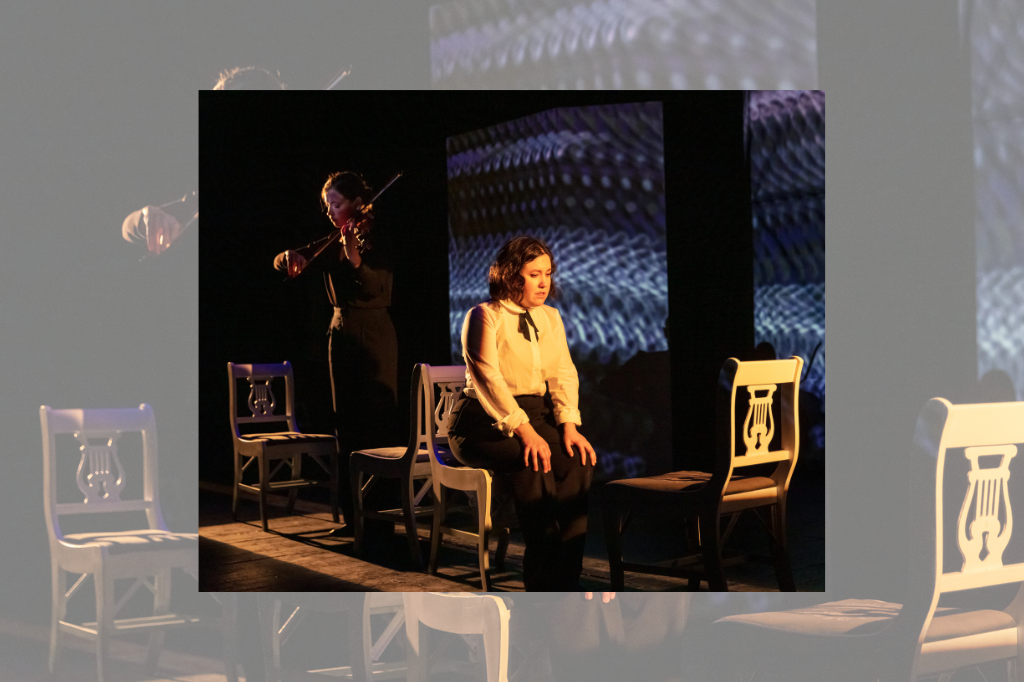REVIEW: Never the Last at Delinquent Theatre/Theatre Passe Muraille
Theatre fans with a soft spot for stringed instruments are sure to have enjoyed Theatre Passe Muraille’s 2022-23 season.
Following in the atmospheric footsteps of October’s Year of the Cello is Vancouver import Never the Last, a memory play about Russian-Canadian composer Sophie Carmen Eckhardt-Gramatté, whose 10 little known violin solos serve as a sort of narrative skeleton in Christine Quintana’s tender, delicate script.
As Quintana (who also plays the feisty composer) guides us through the pain and pleasures of Eckhardt-Grammatté’s life and musical oeuvre, gifted violinist Molly MacKinnon lingers to the side, flooding the TPM Mainspace with the composer’s 10 caprices, experimental in form and often devoid of coherent melody. For eighty minutes MacKinnon plays, nimbly switching playing styles as needed, from rainlike, plucked pizzicato notes to the more ominous, breathy col legno strokes, played with the wood (rather than hair) of her bow. Director Laura McLean has elegantly staged MacKinnon such that she is not a mere accompaniment to the action downstage — she’s an active participant who happens to play instead of speak.
While Eckhardt-Gramatté’s world was dominated by music, it was not without a piercing, beautiful lover by her side. Expressionist painter Walter Gramatté (played here by a wonderful Amitai Marmorstein) was Sophie’s muse, and she his; as Quintana tells it, the two were a funny, well-matched duo of bohemian artists, gallivanting across Europe, picking out new towns whenever the money ran out. When we see Sophie and Walter meet, trading glugs of bad whiskey, there’s no pretending the two aren’t soulmates: the characters are well acted and well written to boot, vibrant and sharp against the ghostly presence of MacKinnon’s violin.
Quintana’s savvy script is smartly structured, never giving in to the easy sentimentalism that could be made of a true love ended too soon — Eckhardt-Gramatté died in 1974, her husband nearly 50 years prior. The numbered caprices offer a regimented spine to the narrative, signposting the play’s temporal progress and hurtling us towards the inevitable future. There’s much to be said in favour of Never the Last’s pacing, and its skillful avoidance of cliché. Quintana as playwright does not garishly fawn over the remains of a deceased composer — she honours her, with an evident depth of research and a touching, appropriate reverence.
It’s aesthetically where things feel less cohesive. Never the Last plays out against three iceberg-looking walls, which at times serve as canvases for Gramatté’s paintings, and at others as a backdrop for projections of the caprice titles. Jenn Stewart’s set and Joel Grinke’s projections feel strikingly modern against the rugged history of Quintana’s text, and this visual encounter between past and present feels at times unsupported by the motion of the play.
As well, there were some sound quibbles on opening night, where actors’ voices disappeared into the ambient noise of the TPM mainspace. There are moments, too, where it seems sonic balance may not quite be there between the amplified violin and the subtler voices onstage — both drown each other out at different points of the play.
All in, Never the Last is a lovely tribute to a trailblazing composer, who after her death settled in Canada and forever left a mark on this country’s musical landscape. Quintana — as playwright and actor (and singer!) — simply shines, and when she harmonizes with MacKinnon, there’s just nothing better.
Never the Last runs at Theatre Passe Muraille through April 16. Tickets are available here.














Comments